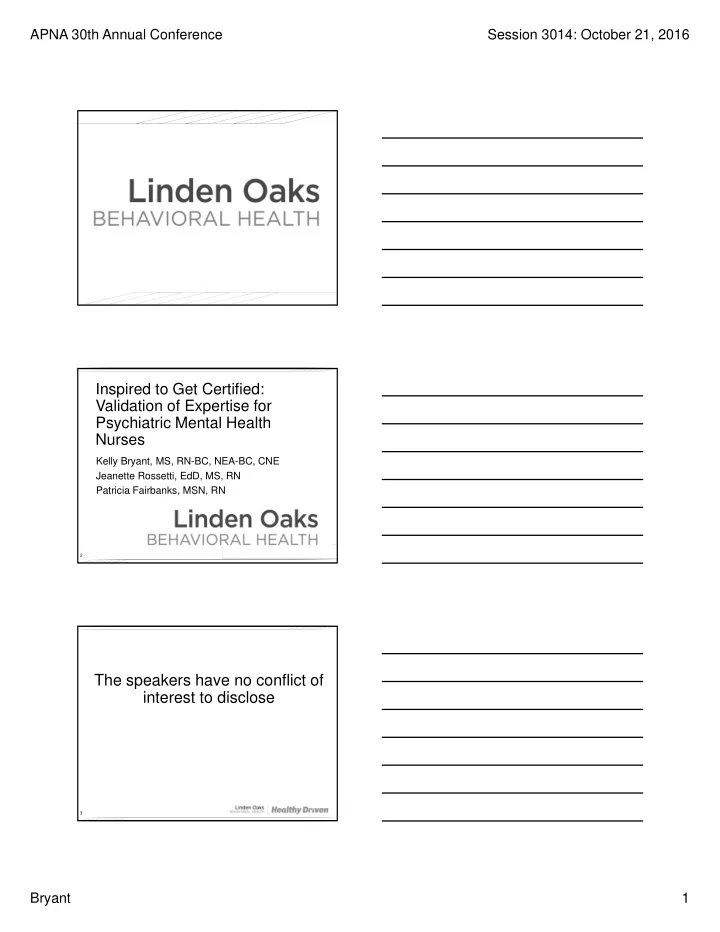

APNA 30th Annual Conference Session 3014: October 21, 2016 Inspired to Get Certified: Validation of Expertise for Psychiatric Mental Health Nurses Kelly Bryant, MS, RN-BC, NEA-BC, CNE Jeanette Rossetti, EdD, MS, RN Patricia Fairbanks, MSN, RN 2 The speakers have no conflict of interest to disclose 3 Bryant 1
APNA 30th Annual Conference Session 3014: October 21, 2016 Outcomes • Describe the required structural empowerment outcomes related to nursing certification when pursuing Magnet designation. • Explain an organizational strategy and formalized plan to facilitate the achievement of increased specialty nursing certification in a behavioral health care setting. • Identify ways in which certification facilitates higher standards of nursing care excellence in practice and better patient outcomes. 4 Overview/Purpose • Magnet requirement - demonstrate commitment to professional development Structural Empowerment Outcome (SE3EO) Targeted goal to improve nurse certification Supporting evidence graphically displayed • Strategic organizational goal established for specialty nursing certification annually 5 Relevance to Psychiatric Nursing • Specialty expertise – hallmark of nursing excellence and professionalism • Complexity of care requires nurses possess higher levels of education and training • High standards of safe, effective, quality care demonstrated with specialty certification • Consistent with care delivery model (Tidal Model) - patient centered & recovery based 6 Bryant 2
APNA 30th Annual Conference Session 3014: October 21, 2016 Action Plan • Incorporated into organizational strategic plan • Established annual achievement targets • Focus groups identified barriers for testing • Established strategy to address barriers • Certification Review course offered • Monthly tracking of outcome • Acknowledgement of certification • Celebration Luncheon 7 Removal of Barriers – Strategy • Review Courses conducted onsite • Conducted by psychiatric nursing faculty • Provided study materials (manual/books) • Formalized study plan for success • No money outlay by nurses • ANCC/Success Pays Program Cohorts Study • Support and “Tutoring” of Cohort groups 8 Review Course Overview • Conducted by psychiatric nursing faculty • Course syllabus developed - objectives/assignments delineated - eligibility criteria reviewed • Class focus - key points & exam item review - test taking strategies and item “analysis” - assistance with online registration 9 Bryant 3
APNA 30th Annual Conference Session 3014: October 21, 2016 Number of Attendees at Psychiatric Nursing Review Courses 20 18 16 14 12 Number 10 8 6 4 2 0 Oct 2014 Feb 2015 Oct 2015 May 2016 Number of Attendees 18 11 13 7 10 Organizational Results for Professional Nursing Certifications 80 71% BSN 70 70% BSN 71% BSN page 37 60 Number of Certification Earned 50 40 63% BSN 30 20 10 0 Baseline, 2014 Dec 15 Mar 16 June 16 Certifications Earned 26 56 63 66 Overall The grap 11 Outcomes for Organization • Incremental increase in specialty certifications • Met or exceeded established goals • Unanticipated outcome – increased number of BSN nurses at measurement periods • Advanced Psychiatric Nursing Curriculum - fostered nurse empowerment - nurse recognition of specialty knowledge - research on curriculum validated outcomes 12 Bryant 4
APNA 30th Annual Conference Session 3014: October 21, 2016 Celebration and Commitments • Celebration of Success • - Acknowledgment for passing certification exam - Plaque reflects certified nurses by name - Paid attendance at APNA programs • Certification Luncheon March 2016 - special event for certified nurses - shared research findings from curriculum - pledge cards signed – be a “champion” - drawing/prizes awarded – APNA membership 13 Future Direction • Increased certified nurse involvement in tasks forces, committees, and quality initiatives • Integration of certified nurses in nurse excellence actions and interdisciplinary teams • Participation in local/national APNA programs • Continued support with review course and Success Pays program enrollment • Annual recognition on Certified Nurses Day • Sustain the gain – prepare for re-certification 14 References • American Nurses Credentialing Center 2014 Magnet Application Manual. (2013). • American Psychiatric Nursing Association. (2015). Psychiatric Mental Health Nurses. Retrieved from http://www.apna.org/i4a/pages/index.cfm?pageid=3292 • ANCC Commission on Certification (January 2008). Retrieved from www.nursingcertification.org/faq.htm# • Fleishman, R., Meyer, L., & Watson, C. (2011). Best practices in creating a culture of certification. Advanced Critical Care, 22(1), 33-49. • Haskins, M., Hnatiuk, C., & Yoder, L. (2011). Medical surgical nurses’ perceived value of certification study. MedSurg Nursing, 20(2), 73-77, 93. • Institute of Medicine. (2010). The future of nursing: leading change, %20 health. Report recommendations. Retrieved from http://www.iom.edu/~media/Files/Report%20Files/2010/The- Future-of-Nursing%20of%Nursing20201Recommendations.pdf • Perlstein, L, Hoffman, R. Lindberg, J., & Petras, D. (2014). Addressing barriers to achieving nursing certification. Journal for Nurses in Professional Development ,30(6), 309-315. • Seaman, M., & Bernstein, A. (2010). Let’s get certified: An innovative national campaign. Nurse Leader, 8(6), 31-36. • Valente, S. (2010). Improving professional practice through certification. Journal for Nurses in Professional Development, 26(5), 215-219. 15 Bryant 5
Recommend
More recommend